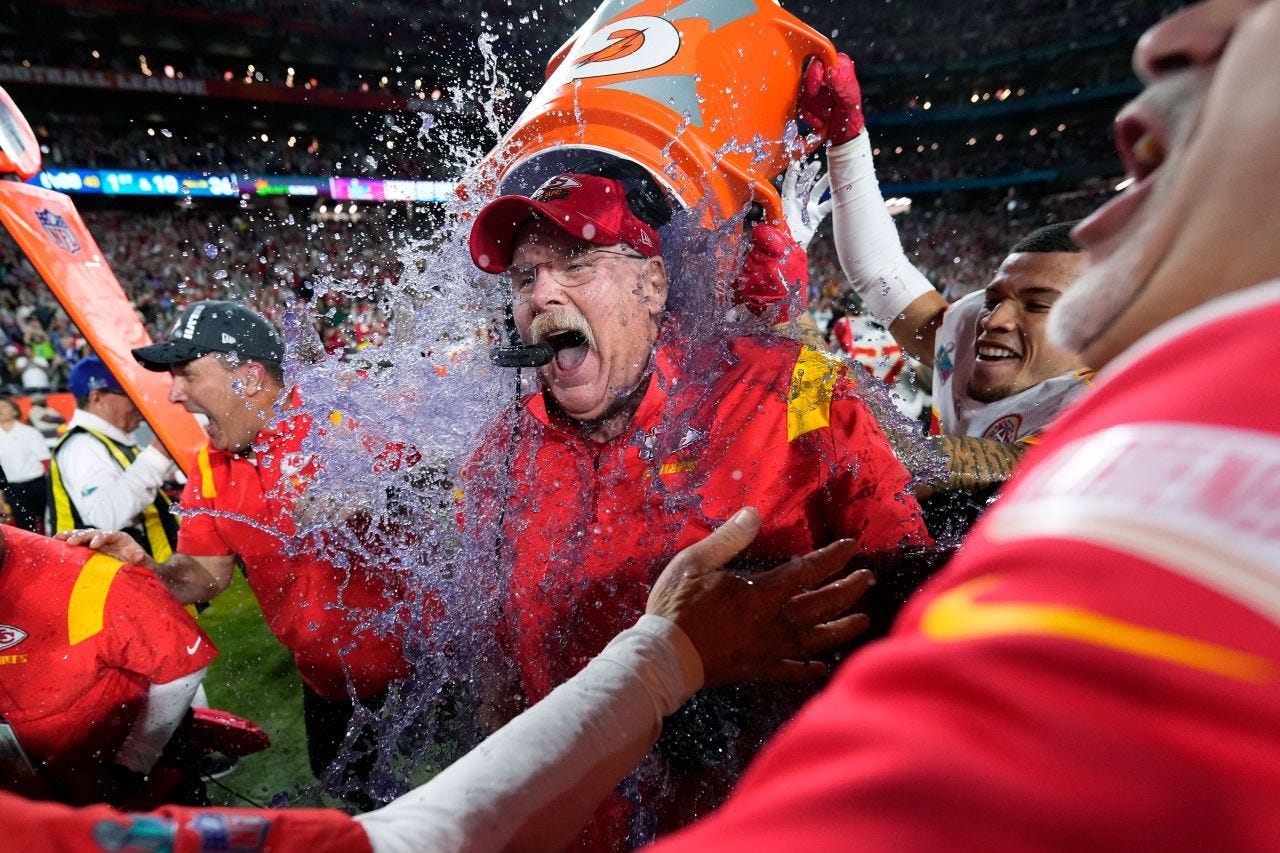Answering the Question: "Don't Owners Deserve Profit for Taking All the Risk?"
Workers risk limb and life. Owners risk becoming workers.
Welcome to JoeWrote, where I (Joe) explain and explore Socialism with simple words and real examples. If you enjoy this post, you can support my work by becoming a free or premium subscriber. Enjoy! Joe

In a recent post, I answered a common question that arises when discussing the Socialist approach to labor.
I suggest you read it in full, but to summarize, I illustrated how humans naturally accredit the person who creates products (the worker), not the person who owns the tools used in the creation (the owner). For example, NFL fans are praising Patrick Mahomes for leading the Kansas City Chiefs to a Super Bowl victory, while almost no one knows the name of the team owner, and even fewer think he “won” the Lombardi trophy.
It is for this reason Socialists believe workers should be entitled to a business’s profits, not the owners.
In my experience, the most common critique of this argument comes from pro-Capitalist who point to the issue of “risk.” I’ll attempt to steelman their argument, which goes something like this:
“Yes, workers create products through their labor, but business owners are the ones taking all the risk. If a business fails, the owner has lost theri investment, which might be their life savings. Meanwhile, the workers have lost nothing, and are free to find another job.”
There are a few reasons “owner risk” is not a good reason to give the suppliers of capital full dominion over the business.
Risking What, Exactly?
For owners, the risk-reward of starting (or purchasing) a business is straightforward. They front the capital necessary for business activity, such as the tools, factories, offices, computers, materials, and money needed for the business to function. In return for providing all of this, they have the legal right to control the business and collect all its profits. Here we see the first reason I find “owner risk” to be an unserious argument.
What the owner “risks” is finite. When a Capitalist starts a business, they are putting up a limited amount of money in exchange for the chance of unlimited reward. Figures vary depending on the industry, but on average founders put up between $30k and $40k to start a business. Nowhere else in society is one able to achieve limitless reward for limited risk. And for good reason. This tradeoff is not logical, and exists only in the artificial construction of Capitalism.
And though the odds of “limited risk, unlimited reward” is obviously nonsensical, there is a stronger reason I see “owner risk” as a falsehood. When all is said and done, the only thing a business owner risks is becoming a worker themselves. If the owner’s business goes bankrupt and they lose everything, they will have to find employment to survive. So when we say owners are taking a “risk” by starting a business, the only risk is subjecting themselves to the very conditions their workers live under.
To state the obvious, a system that gives someone the chance of unlimited reward for simply “risking” becoming a member of the working class is deeply flawed and unserious.
Worker Risks
To no surprise, those who like to wield “owner risk” as a cudgel in their argument against Socialism seldom address the very real risks workers take every day. While owners risk things, workers risk their lives, limbs, and minds. Though unions have raised the safety standards of modern work greatly, contemporary workers face all manner of risks every time they clock in.
Amazon warehouses are notoriously dangerous, not only for their high walkways and heavy machinery but for the unbearable demand the company puts on its workers, which has resulted in many Amazon workers dying of cardiac arrest. Even jobs we consider less taxing, such as Uber drivers and food delivery drivers are quite deadly, as auto accidents are one of the leading causes of death for Americans ages 1 - 54. In fact, research shows rideshare services have led to a 3% increase in traffic fatalities since 2011.
Physical safety aside, workers also take risks inherent to the dictatorial hierarchy of workplaces, such as mental abuse and sexual harassment, as recently came to light with a string of McDonald’s franchises in Nevada, Arizona, and California.

When viewed as a whole, we see how the argument that owners should control a business and reap its profits because they “take all the risk” does not hold up to scrutiny. The most substantial risk an owner takes is losing their business and being forced to become a worker themselves, where they will be subjected to real risks, like death and sexual assault. Coupled with the fact that under Capitalism, an owner can reap an unlimited reward for limited risk, we see how owners aren’t the daring risk-takers Capitalism makes them out to be.
But there’s more to this story.
Instead of sustaining the Capitalist economy, in which risk is inherent, we should move towards an economic system in which risk is entirely absent.
I’ll address that in the next article, so subscribe so you don’t miss it.




I don't understand why risk are reward are treated as though they must all be given to one side or the other. In reality, it takes both the owners and the workers to make a successful business. The contributions of both are valuable, and deserve full compensation. Hence, the rewards of success ought to be split more equitably than they are today in most cases. I'm OK with Jeff Bezos making millions, but does he need billions while his workers make on the order of $50K / year? Couldn't he make do with one billion? or five billion? Corporate charters are controlled by laws, and those laws could mandate that profits and ownership be split among workers and owners according to some equitable formula, which could be tweaked as experience indicates. Hey, workers could even be included among the owners, automatically, as a matter of law. Is that so wrong?
I am a business owner and this is legit. The risk is having to become a worker. But... I am always "on". There is no "vacation" without work. I have had plenty of holidays over the years, and have worked during all of them. The potential for legal action goes up when you own a business. PayPal can lock your funds. Staff hide in the warehouse to check phones all day. They make mistakes and send customers the wrong item. You get yelled at by customers and staff. You have a nervous breakdown or two because sales are down. There's a pandemic and you have to stop trading. There's not knowing how much you'll earn from one day to the next. You have no retirement savings because you have to sell the business to make money (if it sells). If you get bored, you can't just "change jobs". There is more to risk than you're letting on. I am a progressive socialist. I grew up with a communist father who was a farmer, and at a time and place when communism was about worker's rights not despotism. Anyway, I just wanted to remind you that this argument is far more nuanced.